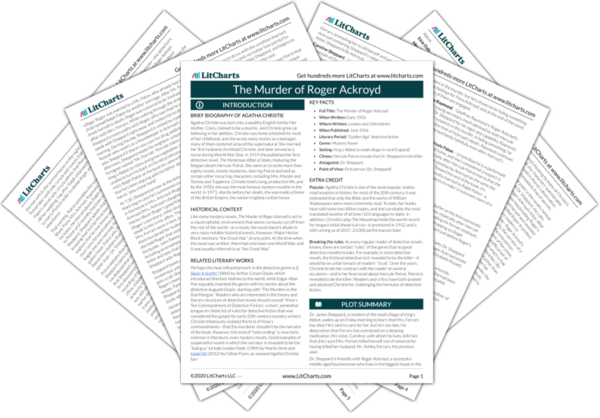Summary
Analysis
The afternoon after he sees Mrs. Ackroyd, Dr. Sheppard comes home, and Caroline informs him that Geoffrey Raymond has left—he was looking for Poirot. Poirot has just returned to his home, Caroline adds. She suggests that Sheppard go over to tell Poirot that Raymond is looking for him, but Sheppard refuses. Then Caroline gives him a pot of jam which, supposedly, she’s promised to give Poirot. Faux-casually, she tells Sheppard that, while he’s over there, he should tell Poirot that the boots are black.
Caroline clearly wants Dr. Sheppard to tell Poirot about the color of the boots as soon as possible, but doesn’t seem to want to go tell him herself—so she sends Sheppard, supposedly to deliver a pot of jam.
Themes
At Poirot’s house, Sheppard presents Poirot with the jam and tells him about his conversation with Mrs. Ackroyd. Poirot is interested in this information, but not too excited. The key point, he and Sheppard agree, is that Miss Russell was coming through the room from the outside, possibly because she’d gone to meet someone. Sheppard tells Poirot that the boots were black—information which seems to disappoint Poirot.
Poirot still refuses to explain why he was so curious about the color of the boots. However, he’s interested in the information Dr. Sheppard offers him about Miss Russell, and agrees with Sheppard that she’d been meeting with someone.
Themes
Poirot asks Sheppard about his appointment with Miss Russell. Sheppard tells Poirot that, after the confidential portion of the visit, Russell asked about drug use and poison, mentioning cocaine. Poirot then produces a newspaper story about cocaine use from last Friday: this is probably why Russell mentioned cocaine.
Supposedly, Dr. Sheppard isn’t legally obligated to remain silent about his appointment with Miss Russell, provided that Russell wasn’t talking about her medical condition. (This is a questionable interpretation of the law, but hey, it’s a mystery novel.)
Themes
Raymond arrives at Poirot’s house, explaining that he’s anxious to catch Poirot. He has a confession to make: before Roger Ackroyd’s will was opened, he was in debt. Now, with the money Ackroyd left him, he’s fine. Raymond wasn’t going to disclose this information previously, since he was afraid he’d incriminate himself, but he’s realized that he has an airtight alibi, and therefore has nothing to worry about. With these words, Raymond leaves, smiling. Alone, Poirot tells Sheppard that he trusts Raymond’s explanation—although, if Raymond didn’t have an alibi, Poirot might be suspicious. In all, he’s come to realize, almost everyone had a motive to kill Ackroyd, except Major Blunt. However, Poirot adds, he has a feeling Blunt is hiding something. There’s an old saying: the English only conceal their love—and Blunt isn’t good at concealing anything.
Much like Mrs. Ackroyd, Raymond has taken Poirot’s statement to heart: he’s been hiding something, and he decides that it’s best to come forward and spill his secrets. Raymond’s secret, however, seems pretty trivial, and certainly not much of a reason to kill Roger Ackroyd—so either he’s still hiding something bigger, or he’s not much of a suspect in the case. The same goes with Blunt: Poirot believes that Blunt is in love with someone (this someone, we can guess, is probably Flora, with whom he was speaking flirtatiously in an earlier chapter).
Themes
Get the entire Murder of Roger Ackroyd LitChart as a printable PDF.

Sheppard suggests that Roger Ackroyd’s killer wasn’t Mrs. Ferrars’s blackmailer. Poirot agrees, suggesting that Parker may have been the blackmailer but not the killer, and may have removed the letter. Sheppard remembers that, when he first burst into the study and found Ackroyd’s body, he didn’t notice if the letter was there or not. Poirot decides that he and Sheppard are going to try “a little experiment” on Parker.
One of the challenges of the case is that there are multiple crimes: the theft, the murder, and the blackmail. Although it would seem to make sense that the crimes are connected, there’s no guarantee that they are, or that they’re connected in a causal or coherent way.
Themes
At Fernly, Poirot and Sheppard greet Flora, and Poirot tells her that they’re going to test Parker’s innocence. Poirot then greets Parker and explains that he wants Parker’s help testing whether it’s possible to hear voices from the terrace outside the study window. He asks Parker to fetch a tray, so that they can reenact the scene. Parker does so and stops outside the study, and Flora tells him, “Mr. Ackroyd doesn't want to be disturbed,” just as she did on the night of the murder. Parker nods and says, “Very good.” Poirot notices that Parker has brought two glasses—Parker claims that he did the same on the night of the murder, since he always brings two glasses. Poirot thanks Parker and dismisses him. Alone, Dr. Sheppard and Flora ask Poirot what he’s up to. Poirot explains that he asked about the glasses because “One must say something.” He says he’s learned something he’s been curious about for a while.
Poirot convinces his suspects to help him solve the case, but he’s not always clear about what, exactly, he’s using them for in his “little experiments.” For example, at the end of the chapter Poirot will only say that he’s learned “something” important from Parker and Flora’s recreation of the crime, raising the question of whether he was really interested in whether it’s possible to hear voices from the terrace—or whether his “experiment” was just a diversion to distract someone into divulging a different kind of clue.
Themes












